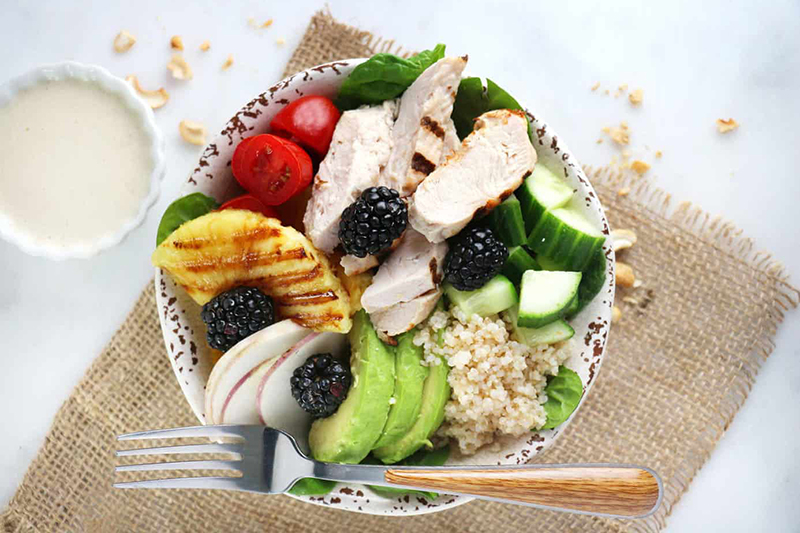Turkey Boasts Brain-Boosting Nutrients
Five Nutrients in Turkey for Healthy Brains
Learning and eating well are hot topics for September! Not only is it back-to-school time for the kiddos, but it’s also a popular time to hit the reset button on your own health routine. And because what you eat has a big impact on your ability to learn – for kids and adults alike – September’s blog is all about turkey and brain health.
Turkey is packed with essential nutrients to help your brain function at its best. Here is a closer look at some brain-healthy nutrients turkey offers.
Brain-Boosting Nutrients in Turkey
- Protein – Turkey is packed with lean protein, which is important for the structure and function of your brain. Protein provides the building blocks (amino acids) for brain chemicals called neurotransmitters that help your brain and your nervous system cells communicate.
- Iron – An essential mineral, iron helps your cells work smoothly and your body utilizes energy. Iron also helps deliver oxygen to your brain to keep you energized. Turkey, like all meat, contains heme iron, a type of iron that is easily absorbed by the body.
- Zinc – Not only is zinc beneficial to the immune system and fighting infection, but it also helps with brain growth and development. Zinc has also been linked to reduced risk of depression symptoms and boosted mood. The easily absorbed zinc in turkey helps to absorb zinc from plant foods like veggies and whole grains.
- Selenium – This essential mineral acts as an antioxidant, protecting your brain cells from oxidative stress and damage so it can work optimally. Dark meat cuts of turkey (like in these turkey thighs) have even more of the brain-loving selenium, as well as iron, zinc, compared to white meat.
- Vitamin B12 – Only found in animal protein like turkey, vitamin B12 helps create the mood-regulating chemical serotonin. Since your body can’t store vitamin B12, and low levels can increase risk for depression, it’s important you get some every day from food or supplements.
Neat to Know: Turkey also contains a small amount of tryptophan – an amino acid – which your body uses to make serotonin, which is often called the “feel good” hormone because it helps with mood, boosting your feelings of happiness.
Easy, Healthy Meal Ideas for September
Schedules change, lunches shift from poolside to packed, and after-school activities mean busy weeknight dinners, making quick and nutritious meals essential. With that in mind (pun intended), here are a few tasty (and simple) ways to incorporate this brain-loving protein in September.
- Wraps & Sandwiches: With endless flavour combinations, sandwiches, and wraps are tasty, easy-to-pack lunch options for school or work. To make them a balanced meal: layer on some lean turkey, load ‘em up with veggies, and use whole grain bread or wraps to up the fiber and b-vitamins for brain health.Try out these Curried Turkey Waldorf Wraps for a make-ahead option, loaded up with your choice of leafy greens. I recommend you eat some leafy greens every day – they’re bursting with antioxidants linked to better brain health.
- Salads & Nourish Bowls: Protein-packed turkey plus a variety of fresh fibre-rich veggies delivers long-lasting satisfaction. Enjoyed hot or cold, nourish bowls and salads are a great way to help you meet your veggie goals for the day. Enjoy these Mediterranean Turkey Bowls with a deliciously tangy vinaigrette for dinner, or try this packable Turkey Spinach Cobb Salad in a jar.
- Stir Frys: Strips of turkey breast cook up quickly along with colourful crisp veggies in a simple-to-prepare stir fry on busy weeknights. Add a whole grain like brown rice or barley and you have a super satisfying meal. My family loves this drool-worthy Hot Honey Turkey Stir-Fry with Toasted Almonds. Cool fact: The orange juice in the dressing helps you absorb even more iron from the turkey and veggies.
One final thought: an overall healthy eating pattern is key for optimal brain health – what you eat over time matters most. And it’s never too early or too late to nourish your brain with delicious, nutritious foods, like the turkey recipes I shared above.
Happy Healthy Eating,
Shannon
Sources:
Institute of Medicine (US) Committee on Military Nutrition Research. The Role of Protein and Amino Acids in Sustaining and Enhancing Performance. Washington (DC): National Academies Press (US); 1999. 14, Amino Acid and Protein Requirements: Cognitive Performance, Stress, and Brain Function. Available from: https://www.ncbi.nlm.nih.gov/books/NBK224629/
Choi, S., Hong, D. K., Choi, B. Y., & Suh, S. W. (2020). Zinc in the Brain: Friend or Foe?. International journal of molecular sciences, 21(23), 8941. https://doi.org/10.3390/ijms21238941
Yosaee, S., Clark, C. C. T., Keshtkaran, Z., Ashourpour, M., Keshani, P., & Soltani, S. (2022). Zinc in depression: From development to treatment: A comparative/ dose response meta-analysis of observational studies and randomized controlled trials. General hospital psychiatry, 74, 110–117. https://doi.org/10.1016/j.genhosppsych.2020.08.001
Seppälä, J., Koponen, H., Kautiainen, H., Eriksson, J. G., Kampman, O., Leiviskä, J., Männistö, S., Mäntyselkä, P., Oksa, H., Ovaskainen, Y., Viikki, M., Vanhala, M., & Seppälä, J. (2013). Association between vitamin b12 levels and melancholic depressive symptoms: a Finnish population-based study. BMC psychiatry, 13, 145. https://doi.org/10.1186/1471-244X-13-145
Kanova, M., & Kohout, P. (2021). Serotonin-Its Synthesis and Roles in the Healthy and the Critically Ill. International journal of molecular sciences, 22(9), 4837. https://doi.org/10.3390/ijms22094837

